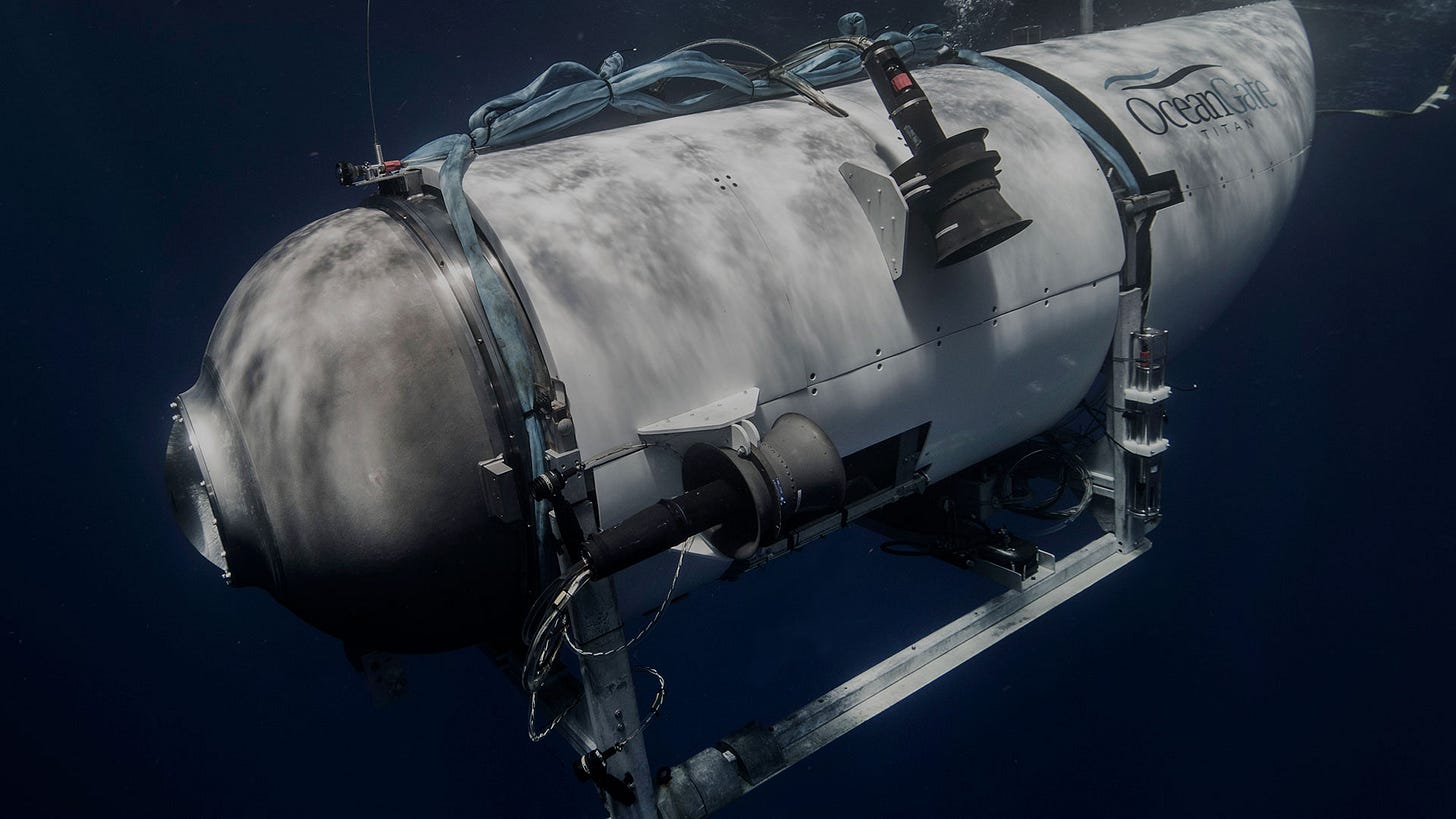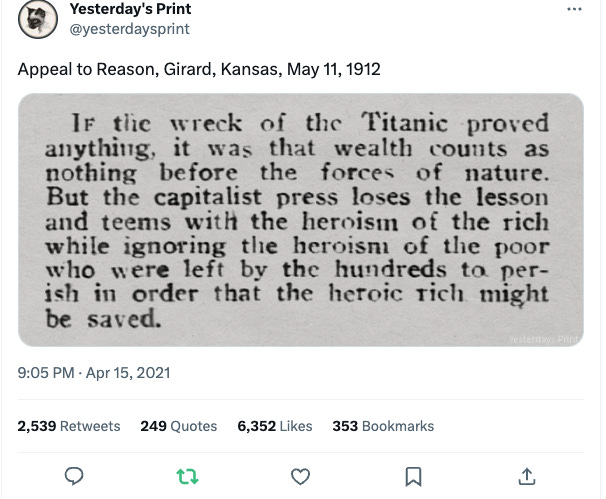"We are not conquerors. We float with the tide."
Deep sea pressure does not care if you are very rich. Unfortunately, the news industry does.
This week’s soundtrack: Cult of Luna & Julie Christmas - “A Greater Call”
I’m white man in middle age, so I like to read stories of explorers. Of course I do. I just reread David Grann’s The White Darkness about South Pole explorers, specifically Henry Worsley and his attempts at traversing the Antarctic by following in the footsteps of his idol Ernest Shackleton. Grann is a terrific writer and storyteller , as the original New Yorker story (and all of his other work) shows, but the stories of Worsley and Shackleton and the others who test the limits of the human body and spirit are interesting to someone like me, a man who played a softball doubleheader on Sunday and felt like he had been hit by a truck.
These explorers are certainly brave and, in a way, noble. They are also fools. Worsley attempted the first solo and unaided crossing of the Antarctic continent in 2016 and died from complications of the expedition. The New Yorker story has an amazing bit in it about Robert Falcon Scott – who died in 1912 on the Terra Nova Expedition – that features the quote “Great God, this is an awful place,” an excerpt from Scott’s diary recovered after his death. Worsley’s wife told him often that a living donkey is better than a dead lion and — at the risk of sounding like a ninny — these explorers always seem to end up a dead lion.
In the case of Scott and Shackleton, they did not attempt to traverse Antarctica in a world where that has been done, so I find them to be less foolish than Worsley. At Amundsen–Scott South Pole Station and otherwise, there are governments working on the exploration and scientific discovery for the greater good of humanity. We don’t need some dude going at it alone. It’s been done. Let the professionals do it. It’s not 1911 or 1912 anymore.
You can probably guess that I’m not just talking about Worsley or Antarctica.
When the news broke on Father’s Day weekend about the Titan submersible losing contact, I was taken aback by how much space my newspaper of choice was devoting to this story. The New York Times had its usual red font timestamp and other developing story treatments on its homepage, which puzzled me because — as someone who fancies himself a media knower — the flights of fancy of the rich and foolish are not news. Little did I know how it would take over the news cycle over the subsequent few days, which was an exercise in the legacy media showing its ass over and over.
In the grand scheme of things, the weeklong ordeal is small as compared to the legacy media’s broad fascination with other flashy things, but that doesn’t change my being concerned about the news industry’s obsession with the submersible. It is a reminder of that we never really left the bad old days of the car chase/lost blonde woman/etc. coverage because that’s what the Titan story was.
At the risk of condescension (which you certainly expect from this newsletter), one of the gatekeeping responsibilities of the news media is to balance the “need to know” information with the “want to know” information. Inside of that is a second important factor: why any story matters. With the most basic “need to know” information, that job is easy; news radio stations do traffic and weather regularly because it is literally the info listeners use for their commutes. There was a period when I was at GovExec that an important part of the job was furiously refreshing OPM’s monitoring status updates during snowstorms in D.C. because it was important to our readers that we sent out a news alert on a story if OPM declared a late start for feds in the D.C. area (telework has changed that, obviously).
The less like the weather any bit of news happens to be, the more readers/listeners/viewers/etc. ask “why should I care?” And they should! A journalist’s job is partially to explain why anyone should care. Journalists are not stenographers.
It’s elitist, I guess, but I cannot find the (noble or quality or valuable) reason why people should care about the submersible over many other stories. Plenty of Twitter users were very quick to point out that the migrant boat tragedy in the Mediterranean merited more coverage, though that’s a fairly naïve (though noble) way to look at the business of media. It’s correct, insomuch as hundreds of people dying is more important to the world in a utilitarian sense, being that hundreds is a lot more than five.
But that’s also not how news is done; heart disease (the number one cause of death in the U.S.) is not covered the same way that more novel causes of death. Moreover, the further away something is from the U.S., the less likely it will be covered and the Mediterranean if quite a far from American shores. The Titanic wreckage, on the other hand, is off the coast of Atlantic Canada.
(There are a host of other reasons that the migrant boat overturning is not at the top of the news, including, but not exclusive to: A general disinterest in European migrant policy, a lack of English-speaking family members of the dead, fewer foreign bureaus, racism, etc.)
More than that, the narrative of the Titan is very attractive for cables news networks and legacy print or online media to cover. You may notice that most journalists don’t talk about the “articles” they wrote, but rather the “stories” they’ve worked on; journalists fancy ourselves storytellers. This was a good story insomuch as it had the same beats as a movie script: The potential heroic rescue, the race against time, the unique nature of the mission, the iconic wreck and so on. You can almost imagine the movie scene in which someone at OceanGate explaining the technology to the passengers before they got on the submersible (ironically, it doesn’t sound like anyone at OceanGate knew what they were doing regarding safety). Narrative storytelling – David Grann is a master of this! – is a huge part of journalism and this was a plug-and-play story. There are shortcuts, as well, as the Titanic has been a subject of the popular imagination since it sank in 1912 and, more recently, when the wreck was discovered in 1985 and the James Cameron film became a massive hit in 1997. It’s not just an easy story, but a fairly novel one with a lot of audience interest in the potential tragedy (which turned out to be the outcome) at the end of the ordeal. Think of Baby Jessica or the Chilean Miners and you’re 90% of the way there.
The above reasons do not absolve the public obsession with the Titan story and they absolutely do not absolve the legacy media – especially TV – covering the story in the way that it did. Multiple cable news networks ran countdown clocks to the submersible’s oxygen running out, the main ones brought on experts (David Marquet claimed to have been on 30 different news programs in a week) and the Times continued to feature it high on its homepage for five full days.
The print/online media did a better job of finding better angles to explore during this whole ordeal and continue to do so. The Times, with all of its resources, has covered the safety problems with OceanGate quite a bit since the implosion (as well as the vessel itself). More niche publications have covered the story in more interesting ways, including Caitlin Dewey’s look at why so many of the meme-ruined (or meme-obsessed) among us were making jokes at the expense of those who died.
At Defector, Sabrina Imbler has one of the best pieces on the whole ordeal and “extreme tourism” itself:
Extreme tourism is not just an unfathomable waste of resources on a faltering planet, though it is very much that: It is also a feedback loop of class, the elite's attempt at becoming even more elite, without actually exerting any physical or mental effort. In a 2017 press release for OceanGate's first crewed submersible expedition to the wreck of the Titanic, Rush described what he saw as the appeal of such a trip: "Fewer than 200 people have ever visited the wreck, far fewer than have flown to space or climbed Mount Everest," he said. How to set yourself apart from the other ultrawealthy, merely by spending some more money.
Imbler’s piece starts by talking about Mount Everest and the amount of money it costs to die on the world’s tallest mountain ($30,000-$75,000, depending) that has, in Imbler’s words, become a “mass grave.” With Everest climbs, however, there is something close to the Antarctic in The White Darkness in that it’s physically difficult, grueling and a test of human will. Like Worsley’ multiple attempts, I can squint and see the reason to want to test oneself by climbing Everest.
Going down to the Titanic wreck in an unsafe tube is nothing like climbing a mountain. If all went well (it did not), the basic same testing of the human will would have been expended there as it was when I went camping at a National Park site last year (though claustrophobia is scary, for sure). It’s cramped, but it was a few people sitting on the floor of vessel that – had it properly passed the certifications needed for such a vehicle – would easily keep the pressure outside the tube and keep them safe.
OceanGate, of course, didn’t get those certifications and plenty of people were ready to bring forward the “I told you so” stuff during and after last week. As mentioned above, I don’t care enough about the flights of fancy of the ultrarich to have done the same, but wow, Big Jim Cameron has been everywhere talking about it.
I’m not a fan of Cameron’s whole public steez – Aliens and T:2 are classics, but Cameron himself is annoying and ever-present. Also, the Avatar series blows – but he’s got the best reason to scream “I told you so!” Cameron went down to the Titanic wreckage in 2001 and even made a whole damned documentary about it (Ghosts of the Abyss is pretty good!); he used uncrewed remote underwater vehicles to really get in there for the documentary’s closeup shots of the wreck. Said documentary is $6.99 to rent or $29.99 to own on disc, which is a lot less than hundreds of thousands of dollars these now very dead men spent to get on the OceanGate. Like the original Titanic, the rich spitting in the face of God himself will leave them at the bottom of the damned ocean.
(OK, I guess I care enough now to say “I told you so.”)
I am unemployed right now. I’m not a billionaire; I don’t have hundreds of thousands of dollars to spend on silly things like OceanGate trips or Virgin Galactic flights or attempts to climb Everest. But, if I did, I would absolutely want to know that I was safe. I think – and this may be class warrior stuff that Dewey writes about – that a lot of ultrawealthy trust other wealthy people inherently, so they don’t think “hey, maybe this should be safety certified.” They see someone in their tiny social class and think “our money insulates us and it imbues value on us and our lives.”
Except the sea doesn’t care. The sea doesn’t care how much money you had or how you wanted to “move fast and break things.” The sea doesn’t care if you’re a good parent or a righteous person or a physically fit or anything like that. I’m reminded of COVID-19 deniers and the recent public health response; no amount of trying or (ignoring warnings) is going to make nature stop doing what it does. At that depth, the sea exploits even the smallest mistakes in construction, which is why safety certification exists (The line between life and death is literally making sure those mistakes are corrected. There is no margin for error). Humankind has tried to tame nature and has succeeded in many ways, but not in this one.
The sea didn’t care.
Broadly, the media didn’t cover the story this way. Yes, people like Marquet were valuable voices on this subject, but the countdown clocks didn’t illuminate anything but suspense. The news media didn’t do enough explaining the hubris inherent in such a trip nor the warped anti-expertise – can you imagine thinking you know more than certifying agencies when your life is on the line in the briny deep? – cultural disease that has engulfed the U.S. Instead, it treated it like the Chilean Miners or other such rescues, despite the huge differences. Like with Musk/Twitter mess, a lot of media orgs are obsessed with the ultrawealthy, despite actual real news happening elsewhere that actually matters to people’s lives.
Lulu Update
It has been vacillating between extremely hot and rainy here in D.C. over the last week, so Lulu has spent a lot of time inside. She knows that the heat is not for her and heads right back inside on our walks.
A Recommendation: ROSALÍA’s Motomami
When I started this newsletter in January, I vowed that this section wasn’t going to be a music recommendations section (mostly because, in a fit of abject pretentiousness, I title each newsletter with song lyrics). I hope I’ve done a decent job of doing so; I think I’ve only recommended music a few times. Today is one of those days.
ROSALÍA (yes, she styles it in all caps), for those unfamiliar, is a Spanish singer who came to prominence a few years ago on the Spanish neo-folk scene (which itself is kind of a thing because of flamenco’s Romani history and ROSALÍA’s background) and really blew up last year with Motomami, a true mélange of style. Spanish language pop music is sorta funny in that Spain itself is not particularly well-represented worldwide as compared to music from the Americas and Motomami is lousy with North American influences, from reggaeton and EDM to bachata and pop. The expanded version has “DESPACHÁ,” one of the best songs of 2022 and even an appearance by The Weeknd on “LA FAMA.” It’s a terrific record and worth your time.







